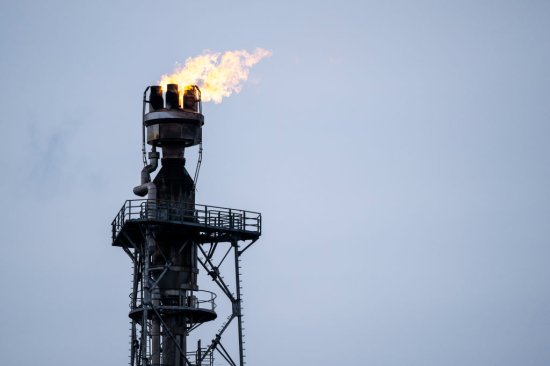
Two and a half years into the war in Ukraine, the effort to wean Europe off Russian oil and gas has stalled.
Two and a half years into Russia’s war in Ukraine, the Western effort to wean Europe off of Russian oil and gas and isolate the Kremlin has stalled. The E.U.’s much lauded energy transition has kept apace, but it has also provided cover for continuing and in some cases increasing purchase of Russian energy that is funding its ongoing assault on Ukraine. The result is an unbowed President Putin, an acute foreign policy failure for President Biden, a geopolitical power shift in favor of the U.S.’s adversaries, and a bleak outlook for Ukraine.
[time-brightcove not-tgx=”true”]Russia’s power in the modern world was—and is—built upon its vast energy and natural resources. As much as 50% of its state budget over the last dozen years has been oil and gas exports. With the E.U. relying on Russian imports for over 40% of its pre-war energy sources—25% of oil, 48% of pipeline gas, 48% of coal—and the 2021 completion of the Nord Stream 2 pipeline to Germany poised to push these numbers higher, Putin seemed to have calculated that the continent was too dependent to risk a proper response to his full-scale invasion of Ukraine in February 2022. It’s now clear he wasn’t wrong.
The U.S., U.K., and E.U. have enacted economic measures to punish the Kremlin. Over 2022 and 2023, Western powers fully or partially banned all imports of Russian crude oil by tanker, oil products, coal, pipeline gas, some liquified natural gas (LNG), and more, and eventually many of the financial mechanisms and technologies necessary to process trade transactions.
These measures were not imposed all at once because the E.U. couldn’t survive a sudden and absolute cut off of its energy supply from Russia. LNG has remained mostly unrestricted, as have nuclear power resources. For oil, instead of banning it outright, the White House led an effort to impose a $60 a barrel price cap on Russian crude to limit Putin’s profits without overly constricting global supply in a way that could increase inflation. Natural gas pipeline exports dried up, with a trickle still passing through Ukraine and up to 38 billion cubic meters per year going to China. But overall, fossil fuel imports from Russia to Europe dropped from €16 to €1 billion a month—from 2022 to 2023, Russian oil and gas revenues dropped by nearly a quarter.
But that’s where Western sanctions stopped working. In 2024, Russia is having a bumper year. Its GDP growth is on track to be above 4%, unemployment is at a record low, and military recruitment and soldiers’ salaries have in turn bolstered record wage growth. Much of this is because the Kremlin is pumping money into military-industrial sectors to support its war effort in Ukraine—40% of public spending is now on defense and security. But domestic war spending is only half the story.
The other half is that the world has given up on giving up Russian energy. The embargoes on Russian energy products are not much more than sanctions theater. Austria is the most flagrant example, with Russian gas still accounting for the vast majority of its energy imports. But even where pipeline gas imports to the E.U. have stopped, the more expensive Russian LNG was never banned so its purchase has increased by almost 20%—leaving Russia as the second biggest seller of gas to the continent, and guaranteeing the Kremlin higher profits. Meanwhile, so-called “shadow fleet” oil tankers carrying Russian oil have been pulling directly into European ports for several months, according to Greenpeace, in violation of Western sanctions. In total, the E.U. has paid Russia over €196 billion for oil, gas, and coal since February 2022, money that has kept the Kremlin flush—Russia has even managed to rebuild its military.
These sanctions failures have also led to diminished global influence for the U.S. Turkey has developed considerable leverage as an energy middleman, and NATO member, which it is using to stymie both U.S. and E.U. foreign policy goals. Meanwhile, President Biden’s careful unwillingness to let Ukraine seize a military advantage for fear of “escalation” has reenforced the impression that its support is far from absolute. China is likely factoring this into its calculations on Taiwan, as is Israeli Prime Minister Netanyahu, as he continues to expand Israel’s war across the Middle East.
There are also environmental concerns. Although the immediate post-invasion desperation to be less vulnerable to Russian energy dominance triggered a massive effort in Europe to replace fossil fuels with renewables, advancing the energy transition by years, the cheap oil and gas Russia in turn made available to China, India, and Turkey set those countries’ transitions back just as much. Meanwhile, several countries in Europe, with Germany leading the way, are increasing their coal power footprint out of energy security concerns, thereby replacing natural gas with the most polluting of any energy source. And as a footnote, black market energy commodities, which are what much of Russia’s exports have become, are usually dirty, and shadow tankers are often leaky and almost always uninsured, creating the potential for catastrophic environmental and economic accidents.
But it is Ukraine that is bearing the brunt of the world’s weakening will to ostracize Russia. With winter less than a month away, the Kremlin has reduced most of Ukraine’s own energy sector to rubble, making it likely that many Ukrainians may die this winter from cold, hunger, or medical conditions that could have been treated if their hospitals had heating and electricity.
The failure to stop Russia from continuing its war of devastation in Ukraine has real and tragic consequences. It isn’t too late to restrain Russia, to fully isolate it from global energy markets, but there’s little evidence of political will.
TIME Ideas hosts the world's leading voices, providing commentary on events in news, society, and culture. We welcome outside contributions. Opinions expressed do not necessarily reflect the views of TIME editors.